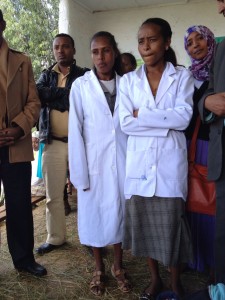Using mobile phones to give young people full access, full choice
The Citizen // by Stella Barozi
 Young people aged 10-24 constitute 25 per cent of the world’s total population, according to the World’s Youth 2013 Data Sheet by Population Reference Bureau (PRB).
Young people aged 10-24 constitute 25 per cent of the world’s total population, according to the World’s Youth 2013 Data Sheet by Population Reference Bureau (PRB).
They account for 32 per cent of the total population in Sub-Saharan Africa.
Young people in Africa and the world over have unique sexual and reproductive health needs. Yet they face barriers in accessing sexual and reproductive health information and services.
Because of this, many of them, especially girls enter the family way early when they become pregnant. This signals the end to their education search, hence shattering their dreams of a bright future.
Lack of information and reproductive health services also puts both young girls and boys at risk of contracting sexually transmitted diseases such as HIV.
In view of this, some international organisations are coming up with strategies to give young people full access and full choice of quality reproductive health information and services.
Pathfinder International, for example, has taken advantage of the mobile phones’ popularity in Mozambique to reach out to young people. The organisation has introduced mCenas!, which means mobile scenes, the country’s first-ever youth-centric text messaging campaign. It delivers information and stories about sex and contraception to young people at the touch of a button.
Likewise, Ethiopia’s Marie Stopes International introduced, in May 2011, a sexual health helpline through which it provides young people with quality counseling services on sensitive sexual and reproductive health issues.
An estimated 43 per cent of people living in Ethiopia are younger than 15. Unmet need for contraception is highest among women aged 15-19 and 62 per cent of callers to the sexual health helpline are aged 16-24. According to information obtained from MSI Ethiopia, 60 per cent of the young callers are female.
In 2012, a year after the introduction of the toll-free helpline, the number of calls reached 54,664. This is equal to an average of 4,500 calls every month. This shows the effectiveness of the strategy which gives young people the freedom to call and get the services they need. The user-friendly helpline guarantees them confidentiality.
Tanzania, whose young people aged between 10 and 24 account for 32 per cent of the country’s total population, needs to adopt the strategy to cater for its young population’s sexual and health reproductive health needs.
Every year, around 8,000 girls drop out of school in Tanzania due to pregnancy. In the past 10 years, according to Centre for Reproductive Rights 2013 report titled ‘Forced Out’, over 55,000 adolescent girls were forced to drop out of primary and secondary schools due to pregnancy.
The trend could be reversed by giving girls full access and full choice of information and reproductive health services.
According to PRB’s World’s Youth 2013 Data Sheet, 7 per cent of Tanzania’s women aged 20-24 were married by age 15 and 37 per cent by age 18.
Tanzania needs to adopt the mobile phones strategy since many young people both in rural and urban areas have access to mobile phones.
Instead of using their mobile phones to send love text messages to boyfriends and girl friends, they could use their mobile phones more meaningfully to access sexual and reproductive health information.
Tanzania Youth Alliance (Tayoa), a non-governmental organisation, has a toll-free number where young people are encouraged to call and inquire about HIV/Aids. The organisation could include reproductive health on its list.
Mobile phone companies too can provide young people with the service, like they do to pregnant women. Tigo mobile phone company, for example, offers free information to expectant mothers through mobile phones upon subscription, on different issues regarding pregnancy.
Such services can be promoted through the media so as to reach more young people.
Stella Barozi is a journalist with The Citizen newspaper in Tanzania. She is in Ethiopia as part of PRB’s Women’s Edition project.


